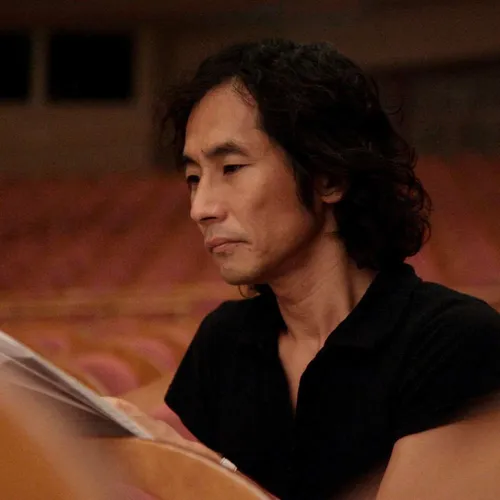
Born in 1965 in Tokyo. He studied composition at Toho Gakuen School of Music, and from 1990 to 1992 attended the Staatliche Hochschule für Musik Freiburg as a DAAD scholar. From 1993 to 1994 he was resident in Paris as a researcher in the Japanese Government Overseas Study Program for Artists, and until 1995 studied computer music at the Institut de Recherche et de Coordination Acoustique/Musique (IRCAM). He studied composition with Yasuo Sueyoshi, Klaus Huber and Salvatore Sciarrino, computer music with Philippe Manoury, and organ with Zsigmond Szathmary.
In addition to taking 1st place in the 1991 Valentino Bucchi Composition Competition, 2nd place in the 1992 International Composer’s Competition “Kazimierz Serocki,” and receiving the Akutagawa Composition Prize in 1996, he was selected for the 1992 International Gaudeamus Music Week in Amsterdam and the 2001 ISCM World Music Days in Yokohama, and has been awarded numerous other prizes at home and abroad.
He stayed in Bergen, Norway as an Artist in Residence in 2003 and served as the Composer-in-Residence at Orchestra Ensemble Kanazawa from 2004 to 2005. He is the 2014 Composer of the Year for the Orchestra Ensemble Kanazawa, the 2017 Artist in Residence for the Sochi Winter International Arts Festival, and since 2023, Composer in Residence for the Aichi Chamber Orchestra.
In 2007, jhapetā –funeral music–, commissioned by Sendai Philharmonic Orchestra, was premiered and earned a good reputation. In 2010, he was featured in some of the innovative concert series for contemporary music, such as “Music of Today (MoT)“ presented by Philharmonia Orchestra at Royal Festival Hall in March, and Decathexis, co-commissioned by Saito Kinen Festival Matsumoto and Carnegie Hall, was premiered in Matsumoto as part of the festival in September and at Carnegie Hall in December by Saito Kinen Orchestra conducted by Tatsuya Shimono.
In October 2013, he was featured “A Profile of A Composer“ presented by Suntory Foundation of Arts, whose program included the premiere of Dead End for organ and orchestra. In 2014, Utopia –nowhere–, commissioned by NHK Symphony Orchestra, was premiered at “Music Tomorrow 2014“ presented by the Orchestra. In 2015, his first wind orchestra piece Time No Longer, commissioned by Tokyo Metropolitan Theatre, was premiered in March, Vice Versa, commissioned by Orchestra Ensemble Kanazawa and
Falling Time to the End, commissioned by Frankfurt Radio Symphony, were premiered respectively in July and in November with great success. He was awarded the 64th Otaka Prize for Vice Versa in 2016.
In January 2014, his first opera Sakurų Prisiminimai was premiered at Kaunas State Drama Theatre in Lithuania.
In February 2022, he premiered Occidens at the opening concert of the Sochi Winter International Art Festival. Commissioned by the Aichi Chamber Orchestra, for which he is composer-in-residence, he gave the world premieres of Strings between Time and Eternity in February 2024, Lacrimae, or 5 Teares in August 2024, and From where the sky splits in May 2025. In 2025, he was awarded the 72nd Otaka Prize for Strings between Time and Eternity.
In recent years, the relationship between "death, eternity, and infinity" and "limited life, and limited music" has been set as his central theme, and though based on Catholicism, he attempts to create musical time through his own unique religious view on life and death. He also serves as an organist at the Catholic Church in Tokyo.
Le 28 février, l'œuvre de Atsuhiko Gondai Strings between Time and Eternity a été créée lors du 72ème concert d'abonnement de l'Orchestre de chambre d'Aichi au MS&AD Shirakawa Hall par la soliste Ayana Tsuji, le chef d'orchestre Kazufumi Yamashita et l'orchestre de chambre d'Aichi.
Comme les autres œuvres récentes de Gondai, Les cordes entre le temps et l'éternité pour violon et orchestre a également été composée avec le si (= la mort, en japonais) comme note centrale.
Gondai s'est récemment mis à écrire ses œuvres en pensant aux personnes qui souffrent.
Si ambulem in medio umbrae mortis, qu'il souhaitait voir devenir un flambeau de lumière pour tous ceux qui ont été confrontés à la mort pendant la pandémie de coronavirus et qui ont emprunté un chemin sombre sans issue en vue, et Chorales Without Words, un recueil de chorales qui n'ont pas pu être chantées en groupe en raison des restrictions liées au coronavirus, et qui ont donc été confiées à la « sonorité » de l'alto et à la « résonance » du piano.
Selon le compositeur, cette nouvelle œuvre Les cordes entre le temps et l'éternité est un requiem pour une certaine personne, et a été écrite comme une musique pour accompagner l'âme du défunt et la guider dans son voyage éternel.
Le solo de violon a été interprété par Ayana Tsuji, commissaire et dédicataire du Post Festum de Gondai en 2019.
Sa sonorité puissante et magnifique sur les cordes a en effet accompagné chaleureusement et tendrement l'âme du défunt avec l'orchestre.
Cette année a commencé de manière inattendue par une série d'événements difficiles. Ce spectacle a constitué un moment précieux pour les auditeurs également, un moment où ils ont pu penser à leurs proches et écouter attentivement leur cœur.